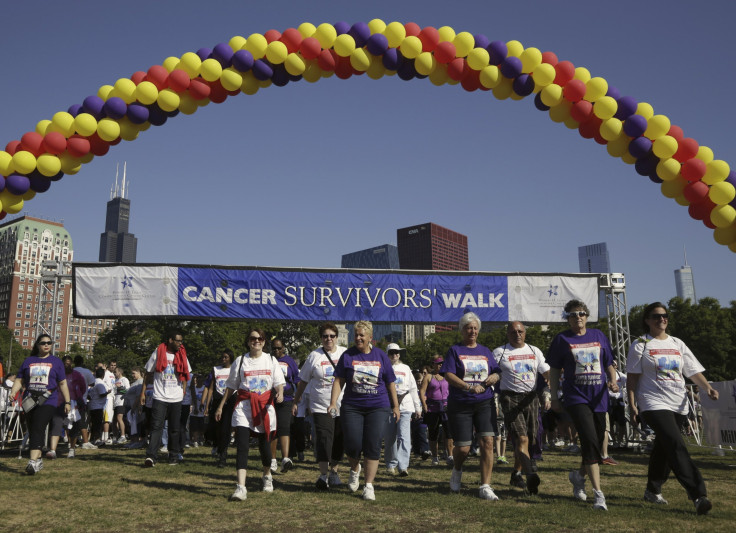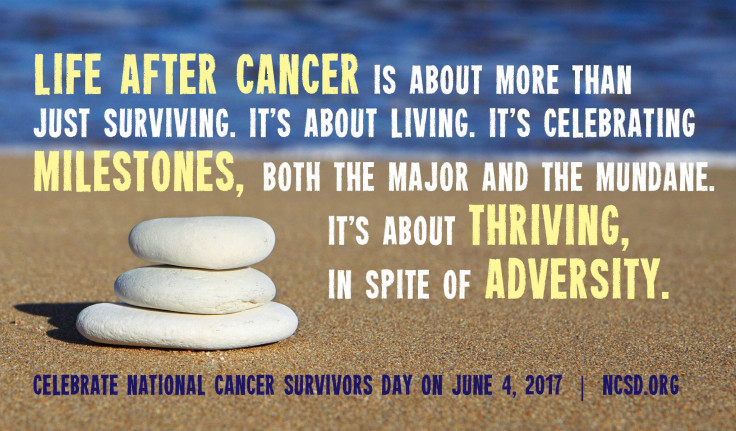National Cancer Survivors Day 2017: How To Stay Healthy After Treatment

Every first Sunday of June is observed as National Cancer Survivors Day across the United States, and it falls on June 4 this year.
The first National Cancer Survivors Day was held June 5, 1988. According to its official website, the day is for “everyone, whether you're a cancer survivor, a family member, friend, or medical professional.”
Read: Olivia Newton-John Postpones Canada, U.S. Tour Following Breast Cancer Diagnosis
According to American Cancer Society, incidences of cancer between 2008 and 2012 were higher among men compared to women. In 2016, prostate cancer was the most common cancer (21 percent) among men and among women, breast cancer was most prevalent (29 percent).
The National Cancer Survivors Day Foundation defines anyone with a history of cancer – from the moment of diagnosis through the rest of life — as a cancer survivor.

It is important for a cancer survivor to live a better life following treatment. Recommendations given to a survivor to lead a healthy life are no different from those given to people seeking better lifestyle, and these tips can prove beneficial as they help with a smooth transition from treatment.
Following are some tips on how to stay healthy after cancer treatment.
Exercise
It is recommended to work out on a regular basis, even for those who are undergoing treatment. While exercise not only improves health, it also makes for a better mood and helps tackle fatigue that arises from the disease.
Missouri-based Alvin J. Siteman Cancer Center advises at least 30 minutes of aerobic activity such as brisk walking and strength training for cancer survivors. The center also says working out should be made a habit by setting a fixed time for exercise.
Follow balanced diet:
Eating a balanced diet is important, even for those without the disease. Try adding two and a half cups of fruits and vegetables each day in the diet, according to American Cancer Society. These should include citrus fruits and dark-green and deep-yellow vegetables. Also, eating high-fiber food is advisable. Limit the intake of fatty foods and red meat should not be consumed more than three to four servings a week. Even pickled, salt-cured and smoked foods should be limited in the diet.
Limit alcohol:
Alcohol is a known cancer-causing agent and American Cancer Society advises that not more than one drink of alcohol should be consumed by female cancer survivors, and two drinks by male survivors, in a day.
Avoid smoking and secondhand smoke:
According to Alvin J. Siteman Cancer Center, quitting smoking is the single best thing a cancer survivor can do. This will reduce the chances of developing a second cancer, heart disease and stroke.
Moreover, just like smoking, a cancer survivor should stay away from secondhand smoke, which can heighten the risk of cancer as well as heart disease.
Maintain healthy weight:
During treatment, a cancer survivor may have lost or gained weight. It is advisable to get back to a healthy weight level. Seek doctor’s or dietician’s recommendation about healthy ways to gain or lose weight.
Regular checkups:
Going for regular checkups post-treatment is a must for cancer survivors. These visits not only help you to keep a check on your health, but it also help you share concerns or ask questions about your health.
© Copyright IBTimes 2025. All rights reserved.






















